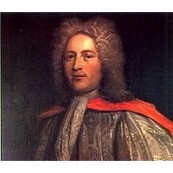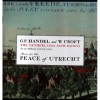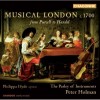Composers
William Croft (baptized 30 December 1678 – 14 August 1727) was an English composer and organist.
Croft was born at the Manor House, Nether Ettington, Warwickshire. He was educated at the Chapel Royal, under the instruction of John Blow, and remained there until 1698. Two years after this departure, he became organist of St. Anne's Church, Soho. In 1707, he took over the Chapel Royal's "Master of the Children" post, which had been left vacant by the suicide of Jeremiah Clarke (one of Croft's pupils in this capacity was Maurice Greene). The following year, Croft succeeded Blow (who had lately died) as organist of Westminster Abbey. He composed works for the funeral of Queen Anne (1714) and for the coronation of King George I (1715).
In 1724, Croft published Musica Sacra, a collection of church music, the first such collection to be printed in the form of a score. It contains a Burial Service, which may have been written for Queen Anne or for the Duke of Marlborough;[1] it has been used at state funerals in the United Kingdom ever since. Shortly afterwards his health deteriorated, and he died while visiting Bath.
One of Croft's most enduring pieces is the hymn tune "St Anne" written to the poem Our God, Our Help in Ages Past by Isaac Watts. Other composers subsequently incorporated the tune in their own works. Handel used it, for instance, in an anthem entitled O Praise the Lord. Bach's Fugue in E-flat major BWV 552 is often called the "St. Anne", due to the similarity (coincidental in this case) of its subject to the hymn melody's first phrase. Croft also wrote various violin sonatas, which are not nearly as often performed as is his religious music, but have been occasionally recorded.
Croft's Funeral Anthem was played at Handel's funeral.
Refine by search
view allBiography
William Croft (baptized 30 December 1678 – 14 August 1727) was an English composer and organist.
Croft was born at the Manor House, Nether Ettington, Warwickshire. He was educated at the Chapel Royal, under the instruction of John Blow, and remained there until 1698. Two years after this departure, he became organist of St. Anne's Church, Soho. In 1707, he took over the Chapel Royal's "Master of the Children" post, which had been left vacant by the suicide of Jeremiah Clarke (one of Croft's pupils in this capacity was Maurice Greene). The following year, Croft succeeded Blow (who had lately died) as organist of Westminster Abbey. He composed works for the funeral of Queen Anne (1714) and for the coronation of King George I (1715).
In 1724, Croft published Musica Sacra, a collection of church music, the first such collection to be printed in the form of a score. It contains a Burial Service, which may have been written for Queen Anne or for the Duke of Marlborough;[1] it has been used at state funerals in the United Kingdom ever since. Shortly afterwards his health deteriorated, and he died while visiting Bath.
One of Croft's most enduring pieces is the hymn tune "St Anne" written to the poem Our God, Our Help in Ages Past by Isaac Watts. Other composers subsequently incorporated the tune in their own works. Handel used it, for instance, in an anthem entitled O Praise the Lord. Bach's Fugue in E-flat major BWV 552 is often called the "St. Anne", due to the similarity (coincidental in this case) of its subject to the hymn melody's first phrase. Croft also wrote various violin sonatas, which are not nearly as often performed as is his religious music, but have been occasionally recorded.
Croft's Funeral Anthem was played at Handel's funeral.




![Baroque Adagios [CD 2 of 2]](http://static.classicalm.com/repository/collection-cover/small/1325-img1362237166532140.jpg)
